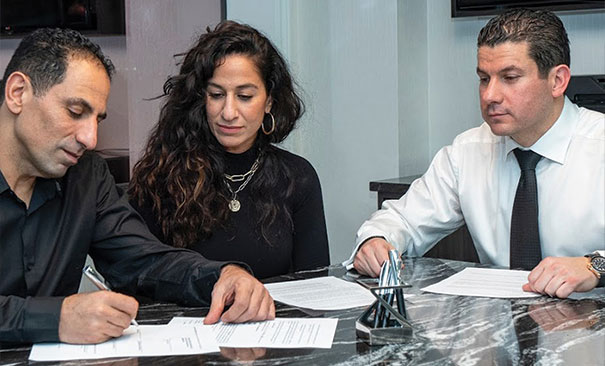You Don’t Need to Hire a Tax Lawyer!
Tax rules can be extremely confusing. Mistakes can cost you dearly in additional tax, interest, and penalties. One way to safeguard yourself is to use professionals when needed and be conscious of how much you spend on them. Unfortunately, consulting a professional whenever you have a tax-related question may not be budget-friendly. So, knowing when to use which professional, e.g., when to use a tax lawyer vs a tax accountant, is important – not just to keep you away from the tax man’s grip, but also to use your financial resources efficiently.
This article will get right to the point. When do you need a tax lawyer, and when do you need a tax accountant?
In most cases, you don’t need a tax lawyer in Toronto. As explained below, a tax lawyer may likely refer you to a tax accountant. As a result, you will end up paying accounting fees on top of unnecessary legal fees.
If you or your company are facing serious tax issues with the CRA, we can help. Schedule your assessment today.
When You Need a Tax Lawyer vs. Tax Accountant
You don’t need a tax lawyer, just a tax accountant when you are:
- Filing personal and/or corporate tax returns under the Voluntary Disclosures Program;
- Making adjustments to previously filed tax returns;
- Responding to a CRA audit or going through one;
- Responding to a proposal/corporate letter from the CRA;
- Filing a notice of objection to an assessment or reassessment; or
- All types of audits, including challenging a net worth assessment, HST/GST audits, flipping houses audits, CRA claims that you underreported the income or overreported expenses, etc.
You need a tax lawyer when you are:
- Making changes to the structure or core operations of a business;
- Expanding your business to other jurisdictions (provinces or countries); and
- Facing a court battle over taxes or penalties.
Also, you just need a tax accountant when you are:
- Filing your taxes and forms;
- Ensuring compliance with your tax obligations;
- Performing corporate bookkeeping, producing financial statements and filling the required returns;
- Making sure that you are reporting numbers that are accurate and correct; or
- Looking to reduce your tax liability to the smallest amount possible.
A TAX LAWYER WILL NEED A TAX ACCOUNTANT TO PERFORM THE ABOVE, SO SAVE ON YOUR LEGAL FEES!




We’ve all been head-to-head with intimidating tax forms. They’re cumbersome, excruciatingly detailed, and the stakes are very high.
A mistake in your CRA tax forms can be very costly, particularly when you’re running a business. That’s why, come tax season, so many of us are quick to turn to a professional.
Getting your taxes done by a pro is the best way to avoid major headaches down the road. But deciding on whether a tax accountant vs a tax lawyer is the right professional for you isn’t as easy as it sounds.
The merits of retaining the services of a tax lawyer vs a tax accountant depend on several factors.
Tax Lawyers vs. Tax Accountants: What They Do
What a Tax Accountant Does
So, what exactly is a tax accountant, and what can they do for you? Well, to understand that, you need to know a bit about how taxes work. There are two stages to proper fiscal practices.
- First, you have tax planning. Most major financial decisions have some fiscal repercussions, and for a business, these can be quite complex. Tax accountants put together strategies to minimize income tax and other forms of taxation.
- Second, tax accountants can assist their clients with their yearly tax returns. They ensure that forms are filled and filed by the proper deadlines, seek out deductions, and read the fine print. They keep a taxpayer on the right side of the law (and the Canadian Revenue Agency).
In that sense, tax accountants are a proactive approach to tax issues. They guarantee that problems will be avoided and taxable revenue will be minimized.
What a Tax Lawyer Does
A tax lawyer is a related, but quite distinct, professional. Tax lawyers are lawyers, and they specialize in tax law, fiscal regulations at the federal, provincial, and municipal levels, and more. A tax accountant in Toronto needs to keep up with different regulations than the ones in Montreal, for example.
A tax lawyer is also experienced in a number of business and legal matters, not specifically tax-related.
Tax lawyers in Toronto and across Canada represent their clients in cases involving the Canadian Revenue Agency or other authorities. They also represent clients who are leaving taxable estates to their children after they pass and can represent clients in tax court.
Another crucial role a tax lawyer has is providing legal counsel to business owners (or prospective business owners). The way you set up a business can have major tax ramifications later on.
When to Work With a Tax Lawyer vs. Tax Accountant
When Should You Work With a Tax Accountant?
Retaining the services of a tax lawyer vs a tax accountant can be a great idea in a number of situations. The exact circumstances during which you should seek out a CPA depends on your particular situation.
For example, retaining the services of a CPA to assist in filing your taxes can be more than sufficient. A business owner, however, has very different taxation requirements and needs. Consult Faris CPA today to see what the right option is for you.
Smaller companies typically have a tax accountant on retainer to deal with their large volume of deductions and paperwork. Larger companies have internal accounting departments and still retain the services of independent CPAs to audit their filings.
Even taxpayers familiar with filing their own returns sometimes need the services of a tax accountant. For others, when filing their first returns as a couple, or after a divorce, professional tax services can be helpful.
When Should You Work With a Tax Lawyer?
While most people need tax accountants on a seasonal basis, the approach to tax lawyers is more reactive than proactive. Certain situations and conditions merit the counsel of a specialist in tax law, but they’re rather specific.
Business owners may decide to preemptively consult tax lawyers to get strategic advice on how to organize their company and holdings.
In much the same way, those who are leaving an estate behind may want to seek out a tax lawyer. Implementing a smart strategy before it’s too late can save your loved ones a lot of work and stress.
Additionally, if you are considering or defending a lawsuit against the CRA, you will need a tax lawyer.
A tax lawyer cannot prepare or file tax form, and will instead refer you to a tax accountant to do so.
Not sure if you need a tax lawyer or tax accountant? Contact Faris CPA today for an initial consultation.
Frequently Asked Questions About Tax Lawyers vs. Tax Accountants
Can a tax lawyer be an accountant?
Yes, however, it’s very uncommon. Both graduating from law school and becoming a licensed CPA are very challenging processes. Few people decide to attempt both, and fewer still accomplish it. Still, they do exist. Some CPAs become tax lawyers for the privilege of lawyer-client confidentiality.
Do tax accountants go to law school?
CPAs do not typically attend law school. Chartered Professional Accountants have to obtain certification, and one of the requirements is a degree in Accounting or related fields. They are most often taught at Business or Finance schools in universities.
How much does a tax lawyer cost vs a tax accountant?
The cost of hiring a tax lawyer vs a tax accountant can vary significantly based on the complexity of the services required and the professional’s experience. That said, however, tax lawyers are generally more expensive due to their specialized legal expertise. CPAs offer a more cost-effective option for all disputes with the CRA, routine tax filings, and all accounting required for corporate and personal tax matters.
Do you need a CPA to be a tax lawyer?
You do not need to be a CPA to be a tax lawyer. Tax lawyers are intimately familiar with tax legislation, but they don’t need to be certified CPAs.



